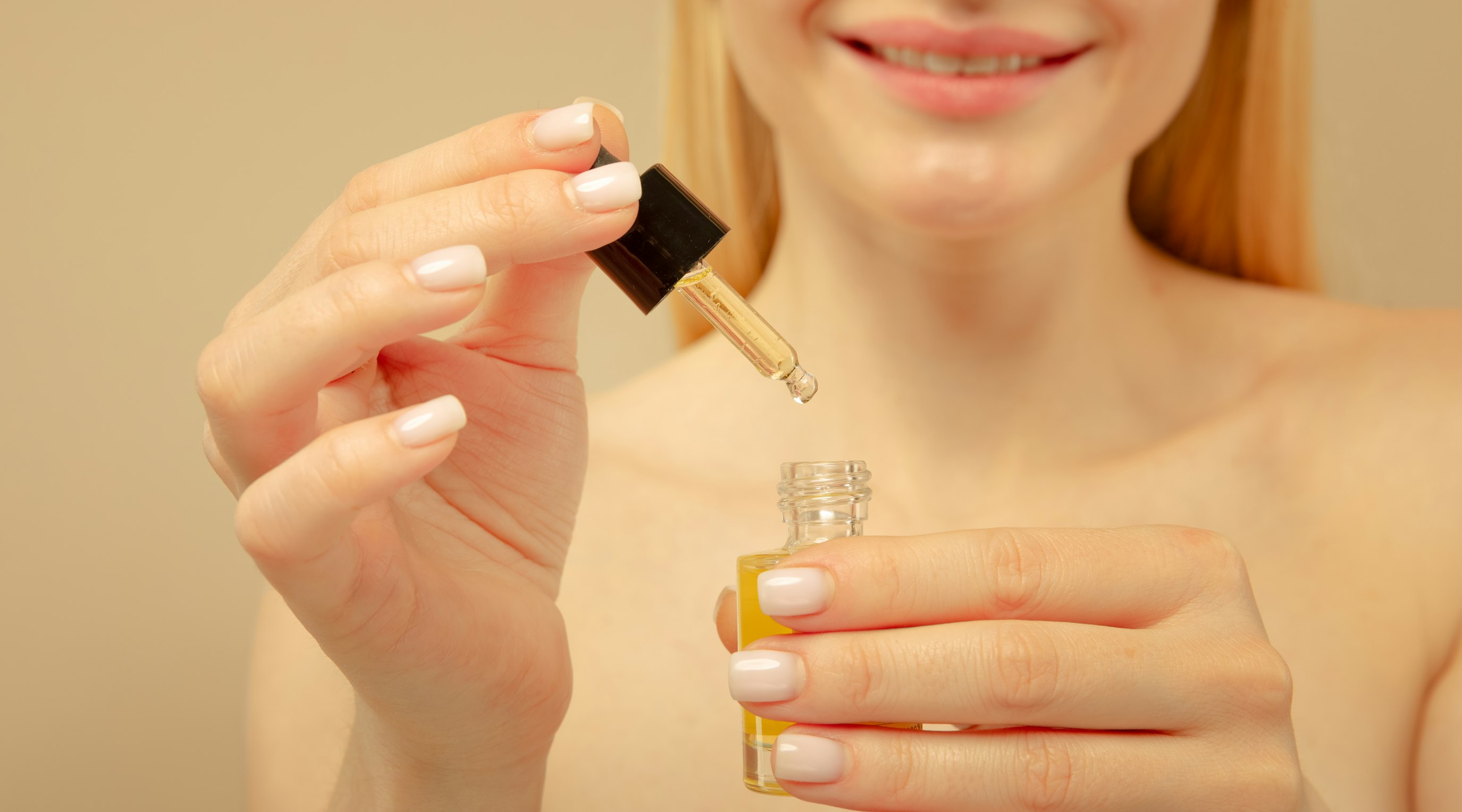THC oil is among the most often prescribed cannabis-based medical products for patients seeking relief from a variety of symptoms. The oil is extracted from the cannabis plant and contains high levels of tetrahydrocannabinol (THC), along with other cannabinoids and terpenes, depending on the specific product.
Potential THC oil benefits include pain relief, reduced inflammation, improved sleep, and increased appetite. It is commonly taken to alleviate symptoms of chronic pain, nausea caused by chemotherapy, and other conditions such as multiple sclerosis and Crohn's disease.
One question we hear from new patients quite regularly is "How long does THC oil last?"...
To give a full answer, we need to have a closer look at how THC oil works in the body and all the factors that go into how long your bottle of THC oil will last.
Contents
Understanding THC oil
Before we dive into the complexities of THC oil, we need to first look at THC itself and how it works.
THC in focus
Delta-9 Tetrahydrocannabinol, more commonly referred to as THC, is one of the two major cannabinoids produced by cannabis sativa L. plants, along with CBD. It interacts with the body' endocannabinoid system and has been shown to offer some of the potential therapeutic benefits associated with medical cannabis. It is also responsible for producing psychoactive effects, commonly known as the "high" feeling, as well as other physical and mental effects.
What exactly is THC oil?
THC oil comes in a range of forms, including tinctures, capsules, and topicals. It is a concentrated form of cannabis oil that contains varying levels of THC, depending on the product. In its pure form, THC is a clear, colourless, and odourless substance, but the vast majority of the medical THC oil options available on the market are prepared with carrier oil. This means you can expect it to be a little thicker than most other oils and usually comes in a darker shade of brown or green. The concentration of THC in these oils can range from 50% to over 90%.
There are three main subtypes of all cannabis oil-based products - full-spectrum, broad-spectrum, and isolate.
- Full-spectrum oil contains all the compounds found in cannabis plants, including other cannabinoids, terpenes, and flavonoids.
- Broad-spectrum oil contains most of the compounds found in cannabis, but with the THC removed.
- Isolate oil is pure THC or CBD extract without any other compounds present.
The type of product you are prescribed is based on your condition and medical history. The effectiveness of cannabis oil may differ from patient to patient, and its "shelf-life" can be influenced by a variety of factors.
Understanding the different methods of extracting THC oil
THC oil extraction methods run the gamut from simple and affordable to complex and costly. The most basic method involves steeping plant material in high-proof alcohol for a short period before straining or using a combination of heat and pressure to squeeze out the desired oils. Neither of these methods is particularly efficient for large-scale production, and as such, they are rarely used for cannabis-based medical products.
Exploring THC Oil Extraction Techniques
The most common form of extraction used by medical cannabis product manufacturers today is supercritical CO2 extraction. This method involves using high-pressure carbon dioxide to pull out the desired compounds from the raw plant material.
The process begins with a machine that compresses an amount of CO2 into a liquid form and then combines it with the plant material. The result is a highly potent cannabis extract that can be further refined into THC oil. This is also thought of as a "clean" method of extraction, as no harmful chemicals are used in the process.
Other methods of extracting THC oil
Aside from supercritical CO2 extraction, there are a few other ways to extract THC and other cannabinoids from the cannabis plant. These include solvent-based extraction methods such as butane extraction, which is also very popular for large-scale production. However, these methods can leave behind residual solvents and require additional refining processes to ensure safety and purity.
Factors that affect the shelf life of THC oil
The duration of time your THC oil lasts will depend on Three main factors.
1) Product type: As mentioned earlier, THC oil comes in different forms, and some may have a longer shelf life than others.
2) Storage method: Storing THC oil can incorrectly can significantly impact its shelf life. Proper storage for THC oil includes always keeping it in a cool, dark place to prevent exposure to light and heat, which can degrade the oil over time.
3) Quality of extraction: The extraction method can also affect cannabis oil shelf life. Some extraction techniques may leave behind harmful solvents that need to be further refined, which can impact the quality and longevity of the product.
Optimal storage conditions for THC oil may vary slightly from product to product, but as a general rule of thumb, you will want to keep the bottle in a place that stays under 21 degrees Celsius and protected from direct sunlight.
So, how long does THC oil last?
The answer to this question depends on several factors, including the extraction method used, additional ingredients added to the oil, and storage conditions. Generally speaking, a concentrated full-spectrum oil can have a shelf life of two to three years.
THC oil in different conditions
If stored in a fully airtight container and at the correct temperature, this may extend the shelf life to over three years and, if frozen, potentially even longer. If the THC oil is not stored in cool conditions, or it is exposed to air, it will oxidise, losing some of the terpene profile and degrading the THC over time, weakening the potency.
Full-spectrum, undiluted THC oil concentrates that are incorrectly stored will last between six months and a year, degrading slowly, month by month.
When a full-spectrum THC oil is diluted with a carrier oil and put into a tincture bottle or capsules, there are multiple factors that will have a beneficial result on the shelf life and longevity of the product. These factors revolve around the storage conditions of the cannabis-based medicinal product. Because the THC oil is suspended in a carrier oil, the shelf life of the carrier oil needs to be taken into consideration, as the THC will only last as long as the carrier oil remains unchanged.
A tincture will have a shelf life of around one year if stored in ambient temperatures that do not exceed 21 degrees Celsius. If stored in cooler conditions, this could push the shelf life span up to 24 to 36 months.
The same rule applies to THC cannabis oil capsules if they are made using seed oils as the carrier. Store in a cool place and do not expose to heat. Keeping them in an airtight container in the fridge away from moisture will ensure the longest shelf-life span for all CBPMs.
Safety and compliance
Here in the UK, THC oil is a controlled substance and only available through prescription. This means that the production, distribution, and sale of THC oil must adhere to strict regulatory guidelines.
Medical cannabis products are subject to regular quality control checks to ensure they meet safety and efficacy standards. It is essential for patients taking THC oil to obtain it from a reputable source, as there have been cases of black market products being contaminated with harmful substances. Patients should also consult with their healthcare provider before starting any new medication.
Here at Releaf, we are committed to providing safe and effective medical cannabis products for our patients. We ensure that all the products available to our patients follow strict production protocols to ensure compliance with regulations and patient safety.
FAQs
What are the main benefits of THC oil?
THC oil is primarily prescribed for pain relief, reducing inflammation, improving sleep, and increasing appetite, especially for chronic conditions and chemotherapy-induced symptoms.
How long can THC oil be stored effectively?
Properly stored THC oil, in a cool and dark place, generally has a shelf life of 2–3 years. This can extend if stored airtight and at the correct temperature.
Is THC oil legal and safe to use?
In the UK, THC oil is legal only through prescription. It must adhere to strict safety and regulatory guidelines to ensure patient safety and efficacy.
In conclusion
THC oil extraction methods and storage conditions can affect its shelf life. Proper storage, including keeping it in a cool and dark place and protecting it from heat and light, can help maintain the potency and quality of THC oil for longer periods.
As long as you keep your prescribed THC oil in the correct container and follow proper storage guidelines, you can trust that it will remain safe and effective for your medicinal needs for up to two years, maybe longer. Always consult with a healthcare professional before starting any new medication, including THC oil. With the right care and attention, THC oil can be a valuable tool in managing various medical conditions.
Don't let the stigma surrounding medical cannabis prevent you from getting a suitable treatment. Releaf provides tailored monthly packages, specialist consultations for medical cannabis, and a unique medical cannabis card for protection, all based on your medical cannabis prescription.
Our extensive blog and education section can provide you with more insights, so feel free to check them out.
Share article
Did you like this article?
It is important to seek medical advice before starting any new treatments. The patient advisors at Releaf are available to provide expert advice and support. Alternatively, click here to book a consultation with one of our specialist doctors.
Elevate your wellness with medical cannabis
Get comprehensive care, convenience, and confidence with an all-in-one treatment plan.
Am I eligible?Authors
Editorial Team
Article written by the Releaf Editorial Team, a group of seasoned experts in cannabis healthcare, dedicated to enhancing awareness and accessibility in the field through their wealth of knowledge and experience.
Editorial Policy
All of our articles are written by medical cannabis experts, guided by strict sourcing guidelines, and reference peer-reviewed studies and credible academic research. Our expert clinical team and compliance specialists provide valuable insights to ensure accuracy when required. Learn more in our editorial policy.
Need more help?










